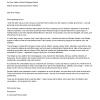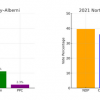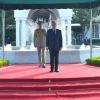Monday 28 February 2022
Dear Dr Spence
We the undersigned are writing as and/or on behalf of colleagues and students who are significantly negatively impacted by UCL’s decision to align with the current Government’s policy to remove all public health protections against Covid. This negative impact arises from being clinically vulnerable or clinically extremely vulnerable due to a health care condition and/or medications for such a condition, living with people with such conditions, or being unable to work or study at home.
“Living with Covid” should not mean ignoring the virus. The world is still in a pandemic, and we are in a local, national, and international situation of considerable health uncertainty and insecurity. Removing all public health provisions aimed at reducing that uncertainty and insecurity makes no sense at this time. It is known that these actions increase the risks and insecurity for people who are more vulnerable to Covid, but yet it is impossible to accurately quantify or estimate the extent of that increased risk.
In such a context, people with greater vulnerability cannot safely come onto campus, but equally should not be obliged to remain at home, which for some will mean continuing or returning to the “shielding” into which they were forced in 2020. People who are known to be particularly vulnerable to Covid are as impacted by social isolation as anyone else, and have been forced to live in isolation for longer than most.
The minor inconvenience for some of wearing a mask in shared spaces seems a reasonable expression of support for public health and for colleagues. The message that this is now optional, and solely a matter of individual choice, directly opposes that expression of collective care. Many staff work in open-plan or shared offices, and devolving responsibility to clinically vulnerable staff to individually request that others wear masks in these shared spaces to those who are clinically vulnerable is not conducive to good working relationships. The demands now placed on these staff to do this or else work at home effectively constitute disability discrimination.
Removal of support for Covid testing on campus also works against collective public health; if testing is an optional action, it is clear that many will not self-test, especially if this now means paying for tests. Those who do self-test will not all be able or willing to quarantine if they are Covid-positive.
Many UK clinicians and/or academics, including at UCL, have already expressed considerable opposition to the Government’s actions.
Two examples:
- Open letter to the Chief Medical Officer and Chief Scientific Advisor, 20 Feb 2022 (Appendix 1, pp. 2-4)
- Statement from the BMA, 21 Feb 2022 (Appendix 2, pp. 5-6)
Please see also the Guardian article by Prof. Christina Pagel, Director of UCL Clinical Operational Research Unit: https://www.theguardian.com/commentisfree/2022/feb/22/johnson-personal-r... and multiple petitions on public petition sites.
We call on UCL to stand up to protect public health, and the health and safety of all its staff and students, by insisting, rather than “strongly advising”, that masks continue to be worn in all shared and communal spaces, and doing its best to provide and support regular testing for Covid infections.
Yours sincerely
Dr Bella Vivat, Principal Research Fellow, Marie Curie Palliative Care Research Department, Division of Psychiatry, UCL; NHS-identified as "clinically vulnerable"
Appendix 1: Open Letter from UK Scientists and Medics Re: Early End to England’s Isolation Rules
Open Letter from UK Scientists and Medics Re: Early End to England’s Isolation Rules
20 February 2022
Dear Sir Chris and Sir Patrick,
Re: Early End to England’s Isolation Rules
As members of the UK's science and medical community, we are writing this open letter to express our concern about Government plans to end testing, surveillance surveys and legal isolation of COVID-19 cases. We ask you to clarify the scientific advice underpinning these policy decisions.
We do not believe there is a solid scientific basis for the policy.
It is almost certain to increase the circulation of the virus and remove the visibility of emerging variants of concern. SAGE 105 minutes noted that:
"The emergence of new variants and a resultant wave of infections can occur very quickly, potentially within just several weeks. The ability to rapidly detect and characterise new variants and to scale up necessary responses (such as TTI and vaccinations) quickly will be very important. Considerations for future response preparedness and surveillance infrastructure should take this into account."
Further, SAGE’s “Viral Evolution Scenarios” document, dated 10 February, noted:
"higher global SARS-CoV-2 prevalence provides more opportunities for viral evolution, while new variants can drive higher prevalence".
We have no reason to assume that all future new variants will be mild. The SAGE document also noted that:
"higher transmissibility does not necessarily mean lower severity or vice versa."
Finally, in their consensus statement of 2 February 2022, SAGE SPI-M warned of increased transmission if self-isolation and testing are removed:
"Warwick’s estimates are equivalent to there being the potential for transmission to increase by between around 25% to 80% if the population were to return to pre-pandemic behaviours and no mitigations."
We believe humanity is in a race against the virus.
We believe the science strongly supports using vaccines combined with public health interventions to slow transmission and regain the upper hand on viral evolution. We must encourage vaccination in all demographics for which there is a medically approved vaccine and give a timely opportunity for vaccination.
Some form of surveillance must be continued to ensure the situation is well understood and new variants of concern identified. Lack of testing is not only detrimental to controlling the spread of SARSCoV2 and detecting new variants, it also puts people who develop Long Covid at a great disadvantage by not having a confirmation of their infection, which is integral to the diagnosis, support and care they need to receive. For the 1 in 4 people in the UK who are clinically vulnerable, the current approach appears a perilous and politicised pandemic response.
Continued and unopposed transmission is a recipe for further adaptation by the virus.
Every strain of SARS-CoV-2 to date has failed to reach population saturation. Instead, each has been replaced by a new variant that is more transmissible, more immunity-escaping or both. This pattern will likely be repeated, and further reinfections will occur, with a continuing burden of disease and displacement in the healthcare system.
We urge you to clarify the extent to which the planned policies are consistent with scientific advice and what specifically that scientific advice contained. We feel that transparency on such matters is an essential requirement of your roles as Chief Medical Officer and Chief Scientific Officer, respectively.
We look forward to your response, with thanks for your hard work throughout the pandemic.
Yours sincerely,
Signatories:
Professor Anthony Costello, University College London
Professor Trish Greenhalgh, University of Oxford
Dr Rochelle Burgess, University College London
Dr. Deepti Gurdasani, Queen Mary University of London
Professor Christina Pagel, University College London
Dr Stephen Griffin, University of Leeds
Dr Kit Yates, University of Bath
Dr Daniel Goyal, NHS Consultant Physician, Oban
Dr David Tomlinson, Consultant Cardiologist and Electrophysiologist, University Hospitals Plymouth NHS Trust
Professor Peter Boyle, University of Edinburgh
Dr Nisreen Alwan, University of Southampton
Dr Alison George, GP & GP in Emergency Medicine, Newcastle Upon Tyne
Dr Sarah Todd, GP, North Derbyshire
Dr Joe Pajak, FRSC CSci, NHS FT Governor
Dr Lucy Williams MRCA, Associate Specialist Anaesthetist, Great Western Hospital
Dr Katherine McConkey, GP, Cumbria
Dr Ian Jackson, Clinical Lead, Vaccination Hub, York & Scarborough Teaching Hospitals NHSFT
Dr Yvette Rean, GP in Kent
Dr Linda Dykes, Consultant in Emergency & Interface Medicine/GP, Herefordshire
Dr Kate Cushing, Newcastle upon Tyne.
Professor Colin Davis, University of Bristol
Dr Peter Dilworth, GP, Merseyside
Professor (Emeritus) Raymond Agius, The University of Manchester
Dr Simon Ashworth, Clinical Director Critical Care, Imperial College Healthcare NHS Trust
Anna Batchelor, Consultant ICM Newcastle upon Tyne, Clinical Lead for GIRFT
+…
Notes
1. As of 27 Feb 2022 3814 signatures, 3079 verified
2. Typographic error in penultimate paragraph: “Chief Scientific Officer” should read “Chief Scientific Advisor”
Appendix 2: Statement from BMA (press release) Monday 21 February 2022
Living with Covid-19 strategy neglects the most vulnerable, says BMA - BMA media centre - BMA
Responding to the statement from the Prime Minister on the Government’s ‘Living with Covid’ strategy, which includes the removal of free Covid-19 tests for the public from 1 April in England, Dr Chaand Nagpaul, BMA council chair, said:
“Today’s announcement fails to protect those at highest risk of harm from Covid-19, and neglects some of the most vulnerable people in society.
“We recognise the need, after two years of the pandemic, to begin thinking about how we adjust our lives to manage living alongside Covid-19, but as the BMA has persistently said the decision to bring forward the removal of all protective measures while cases, deaths and the number of people seriously ill remain so high is premature.
“Living with Covid-19 must not mean ignoring the virus all together – which in many respects the Government’s plan in England seems to do.
“On the one hand the Government says it will keep monitoring the spread of the virus, and asks individuals to take greater responsibility for their own decisions, but by removing free testing for the vast majority of the population on the other, ministers are taking away the central tool to allow both of these to happen.
“Far from giving people more freedom, today’s announcement is likely to cause more uncertainty and anxiety.
“Crucially, it will create a two-tier system, where those who can afford to pay for testing – and indeed to self-isolate – will do so, while others will be forced to gamble on the health of themselves and others.
“Covid-19 has already disproportionately impacted those on lower incomes, in insecure employment and from ethnic minorities. This move threatens to exacerbate these health inequalities.
“People will want to do the right thing, and not knowingly put others at risk if they are infected, but how can they make such a judgement if they have no way of knowing if they’re carrying the virus or not? This is especially important for those who come into contact with people who are at much greater risk of becoming ill with Covid-19, such as elderly relatives or those who are clinically vulnerable.
“Providing free tests to clinically vulnerable people – and only once they develop symptoms and are potentially very unwell - but not providing any free tests to friends or family who come into contact with them is completely illogical, as the priority should be protecting them from infection in the first place. The same goes for care home staff, who will only be tested if they have symptoms, by which time they could have passed on the virus to vulnerable residents.
“There must also be urgent clarity around testing provision for NHS workers. People visit hospitals and surgeries to get better, and not to be exposed to deadly viruses, and the continuation of testing for healthcare workers is invaluable in protecting both staff and patients.
“That plans are underway for a new booster programme is sensible but we must not – as we have continued to state - rely solely on vaccination to protect the nation. The necessity for further boosters underlines that Covid-19 will continue to present a challenge for healthcare services and wider society for potentially many years to come. And while the Prime Minister talks about Omicron resulting in a mild illness for most, others will still become very unwell with Covid-19, and an estimated more than one million people continue to live with long-Covid – themselves needing ongoing care.
“As part of ‘learning to live with Covid’, protections must be maintained for the most vulnerable, including the provision of enhanced face masks, and clear guidance for both patients and clinicians. Meanwhile, all people must be financially supported to do the right thing, and the removal of self-isolation payments, and then access to statutory sick pay in a months’ time, is incredibly concerning, as it will mean people cannot afford to stay at home if they are unwell. In healthcare settings, enhanced infection prevention measures – including mask-wearing for patients and enhanced PPE for staff - must remain, while in the longer-term premises are in desperate need of improvements, such as higher standards of ventilation, to limit the spread of infections.
“And with such a planned scale back of free testing, it is imperative that the Government keeps its commitment to continue other surveillance methods, including the ONS infection survey1, and to not hesitate to act on worrying surges of infections or new dangerous variants.”















